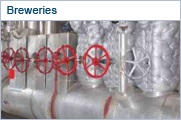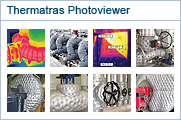Sustainable business practices and social responsibility Thermatras® champions broad social responsibility and awareness of energy use in the business sector. Sustainable business practises must go further than mere marketing-speak, they must be applied in the broadest possible sense within business practice. Environmentally aware business operations offer a concrete framework for responsible business practice in the long term while contributing to broader awareness of the environment with business partners in the short term.
Climate change comes about through an increase in the average temperature on earth, which in turn is sparked by an increase in the concentration of greenhouse gasses in the atmosphere. The weather, and rising sea levels, affect humans and animals. The average temperature on the earth’s surface rose by 0.6°C during the course of the 20th century. This may not seem like much, but the consequences are evident. Three years in the recent past (1997, 1998 and 2003) have been the warmest on record since 1860 – and probably the warmest in the last thousand years. The sea level has risen between ten and twenty centimetres. More rain is falling on areas around the equator. These changes are to some extent man-made; temperatures will continue to rise.
Greenhouse gasses such as carbon dioxide (CO2) and methane (CH4) are crucial for life on earth. Without this combination of gasses in the atmosphere, the temperature would be an average of -18°C. The average temperature on the planet at present is about 12°C. But the concentrations of greenhouse gasses (especially CO2) has risen by 30% since the industrial revolution of two hundred years ago. The accelerated greenhouse effect as a result of this brings climate change in its wake, which is detrimental to life on earth.
If you want to help prevent climate change, saving energy is the most effective way. Being conscientious in your use of electricity, fuel and gas reduces greenhouse gas emission. This contributes directly to solving global climate change problems.
Long-term agreements on energy efficiency / Energy Efficiency Benchmarking Covenant
After the energy crises of 1973 and 1979, the governments of the industrialised nations launched several programmes aimed at reducing energy consumption. Energy users introduced important improvements to energy efficiency back then.
New impetus has been given to the issue through the effects of climate change. Energy use is linked to fuels that often contain carbon dioxide, the principle greenhouse gas. In reaction to increasing concerns about global warming, the United Nations signed a “Framework Convention on Climate Change” in 1992 that was ratified by 186 countries. It was later developed further by the Parties of the Convention, the Kyoto Convention of 1997 being the best known. In the Kyoto Protocol, quantitative commitments were laid down for reductions in greenhouse gas emissions. The EU targets were distributed among the member countries in 1998.
Governments use various means to arrive at greenhouse gas emissions. Besides energy levies and legal measures, the Long-term Agreements on Energy Efficiency (LTAs) in the Netherlands and the Energy Efficiency Benchmarking Covenant in Belgium are also used. Each member state has a similar concept that involves agreements between the government and businesses and institutions about more effective and efficient use of energy. This is not done on a voluntary basis, these are commitments that must be met and participants are eventually obliged to take energy saving measures.
The cost-benefit system used by Thermatras® makes it clear where energy saving options are to be found.











